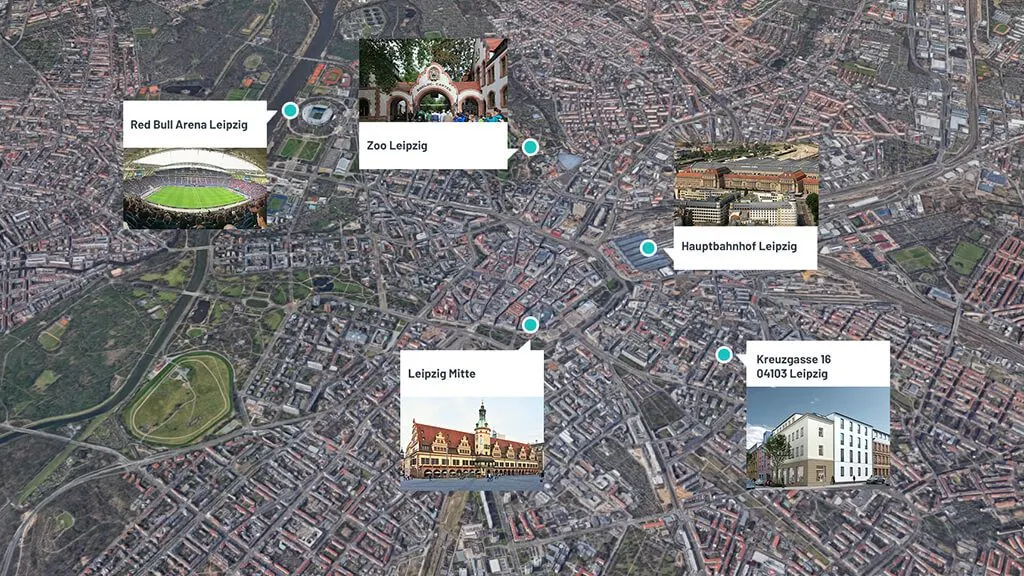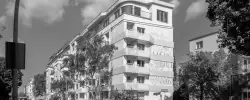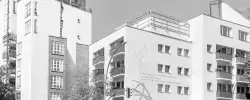Kreuzstraße 16
Return
6% p.a.
Duration
18 months
Project type
Growth
Distribution
Yearly
Notice according to § 12 (2) Vermögensanlagengesetz
This investment involves considerable risk and may result in partial or total loss.Project Presentation
The project is a revitalization of an apartment building in Leipzig, the fastest growing city in Germany. The apartment building is located in the city centre of Leipzig within walking distance of the historic old town and comprises 7 residential units with a living space of 732m² and two commercial units with a usable area of 106m².
Leipzig: the fastest growing city in Germany
For years Leipzig has been growing faster than any other German city. In recent years alone, Leipzig has grown by 10,000 to 12,000 inhabitants per year. In 2000, Leipzig had just under 490,000 inhabitants; today, more than 600,000 people call Leipzig their home. This population growth is due to the varied cultural landscape, the distinctive range of educational opportunities and the strong regional economic growth. International companies such as BMW, Porsche or Amazon have also recognised these positive developments and have settled large operating facilities and office complexes in Leipzig in recent years.
Consequently, this growth is also reflected in the rental prices of recent years. The entire rental market in Leipzig has been experiencing a continuous upward trend for years. Especially the rents for small residential units up to 30m² and apartments with more than 100m² have risen significantly since 2011.
Location
Since 2010, Leipzig has been one of the fastest growing cities in Germany and is experiencing an annual increase of around 10,000 people, which corresponds to annual growth rates of over 2%. Between 2012 and 2014, Leipzig was the fastest growing city in Germany and the actual development exceeded all forecasts. The growth is explained by the strong influx, the attractive labour market and the birth surplus in 2013 and 2014, which last occurred in 1965. In 2015, the population will increase by almost 16,000 and in 2016 by 10,000 inhabitants.
After the fall of the Berlin Wall, however, a number of large industrial settlements were also established, including Siemens (approx. 1,700 employees), Porsche (approx. 2,500 employees) and BMW (with partners and suppliers over 6,500 employees at the Leipzig location). With the settlement of the latter two, the city was able to establish itself as a new automotive location. The entire Leipzig region is an important centre of the energy industry and Leipzig is an energy metropolis. Leipzig operates the Energy and Environment Cluster and has a focus on economic development there.
In autumn 2006 Amazon completed its second and largest German logistics centre. In 2008, the European air hub of the postal freight subsidiary DHL, which was previously located in Brussels, went into operation. This has created 3,500 jobs directly at the airport and around 7,000 in the immediate vicinity.
Explore the surroundings
Adjacent to Leipzig's city centre is the Graphic Quarter which has its origin around 1900. At that time the Graphic Quarter was the centre of the German book trade with well-known publishing houses such as Reclam and Brockhaus as well as countless large printing houses. After the Second World War, many companies moved their headquarters to West Germany and it was not until the 1990s that the district was revitalised with the construction of the Brockhaus Centre. Today, printing presses hardly ever rotate here, but the construction cranes do. Due to its central location, the Graphic Quarter has developed into one of the most sought-after residential areas in Leipzig and is therefore one of the top addresses in the city. The Graphic Quarter belongs to the Unesco initiative Leipziger Notenspur which is a 5.1km long promenade that leads through the entire Leipzig city centre and deals with the musical traditions of Leipzig. At 23 stations, audio files are made available with explanations and musical examples such as those of Johann Sebastian Bach.
Leipzig Zoo
Leipzig Zoo is a 26-hectare (including 2.1 hectares of water surface) large park-like zoological garden on the Rosental, northwest of Leipzig city centre. It is one of the most species-rich zoos in Europe. Since 2000, the zoo has been undergoing large-scale conversion and expansion under the project name "Zoo of the Future". Until 2022, a conversion in individual themed areas is planned. According to the Sheridan Zoo Ranking by the British Anthony Sheridan, Leipzig Zoo has been ranked second among the best zoos in Europe (after Schönbrunn Zoo) and first in Germany for several years.
Red Bull Arena
The Red Bull Arena, formerly known as Zentralstadion, is the largest stadium in Saxony and, after the Olympiastadion Berlin, the second largest in eastern Germany. The football stadium is part of the Leipzig Sports Forum and is located in the immediate vicinity of the Arena Leipzig, which was inaugurated in 2002, the Festwiese and smaller sports facilities. he stadium was newly built for the 2006 Football World Cup and is embedded in the green wall of the "old" Central Stadium, whose main building was preserved. The Red Bull Arena is the home ground of the Bundesliga club RB Leipzig and holds 42,959 spectators.
Central Station
Leipzig Hauptbahnhof is the central passenger station in Leipzig and, with around 120,000 passengers and visitors every day, together with Bremen Hauptbahnhof, it ranks 12th among the most frequented long-distance stations of Deutsche Bahn. The terminus station with 23 platform tracks, 22 of which are used for passenger traffic, is one of the 21 stations of the highest station category 1 of DB Station&Service. With a covered area of 83,640 square metres, it is the largest terminus station in Europe in terms of area. The facade of the reception building facing the city centre is 298 metres wide.

Team
Many years of real estate and financing experience in Germany
All in all, the management of the BDRE Group, consisting of the owner Mr. Till Brauner and Mr. Thorsten Sowada as Managing Director, has many years of experience in the real estate and financial sector.
Till Brauner entered the Berlin real estate business ten years ago and was co-founder of a successful development company. In 2017 he sold his shares to establish BDRE as a venture capital group and to expand his acquired knowledge and use it in a more complex way. He was already able to live out his passion for new things and the challenges they posed in his earlier professional career. For four years he was responsible for sales in parts of Eastern Europe for a large German car manufacturer. As Vice-President, he built up the importer in Dubai and then lived in Moscow for five years as Director, where he repositioned the brand and drove it to new heights. Born in Bavaria and living in many places around the world, he sees himself as a representative of the Bavarian way of life "A word is a word and does not need paper" in the team and generally enjoys the internationality of the people. As the owner, he is responsible for the international expansion of the group, the development of new business areas.
The co-founder, managing director and "foreign minister" of the BDRE Group is always on hand worldwide wherever there is an interest in German real estate investments. As a true "Berliner", he sees himself not only as senior partner of the BDRE Group for the operative business and the Family & Friends investors, but rather as an ambassador for Berlin. No matter where in the world he sits at the table with investors, in the end Thorsten Sowada never misses the opportunity to invite everyone personally for a currywurst at his favourite Berlin sausage counter on Ku'damm. The marketing and network specialist opened Potsdamer Platz with his agency, organized the festive opera gala of the German AIDS foundation for over 10 years and opened the largest German Mercedes-Benz dealership to date. After a request to take over the support of an automobile manufacturer in Russia, the cosmopolitan did not hesitate for long, opened a branch in Moscow and managed to present local and international companies on unknown territory with well thought-out live communication.


